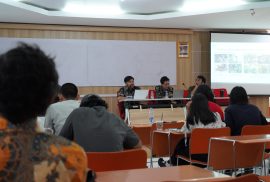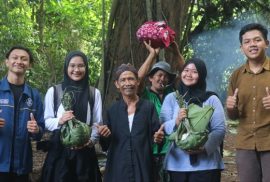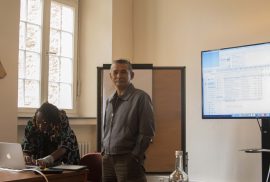During the vigorous campaigns for environmental preservation, often conveyed through data and direct appeals, Kumala has chosen a different path. She presents Green Literature, a program that combines literacy with ecological issues, while also contributing to the achievement of the Sustainable Development Goals (SDGs). According to her, this approach can touch the emotional side of the audience, delivering messages without being preachy.
“Environmental education is often associated with technical data or direct appeals. However, through literature, we can awaken awareness more subtly,” she stated. This program, she continued, supports the goal of Quality Education by providing creative learning based on literature, while also promoting Climate Action through increased ecological awareness.
The selection of materials is done meticulously. Kumala chooses short stories, poems, and quotes from literary figures rich in ecological values. Not only does she consider the content of the message, but she also adjusts the language style to ensure it is easily understood by the participants, especially the students of the pesantren (Islamic boarding school) who are the target of this program. In this way, the values contained in literary works align with the Land Ecosystem, emphasizing the importance of nature conservation.
To make the sessions feel less rigid, Kumala incorporates interactive methods such as quizzes and open discussions. This approach encourages participants to engage actively and feel a sense of ownership. As a result, many who were initially unfamiliar with environmentally themed literary works have become interested in reading more. This interaction not only builds knowledge but also fosters empathy towards the environmental issues facing the world today.
However, the journey of Green Literature is not without challenges. “Literature is sometimes considered boring,” she admits with a smile. The solution is simple yet effective: using everyday language that resonates with the participants, ensuring that the message flows without barriers.
Kumala believes that the power of literature lies in its ability to shape new perspectives. Literature does not force; it invites readers to see the relationship between humans and nature as a harmony, not a dominance. From this perspective, she hopes that the seeds of awareness sown can grow into real change, aligned with the spirit of the SDGs that prioritize sustainability as a global agenda.
“The hope is that after this program, participants can become small agents of change in their environment. At the very least, they will have a new perspective on how to treat nature,” she said. Green Literature may start from a small space, but its impact can spread far, each word becoming a seed that one day can green the earth, while also propelling us towards a sustainable future.
In conclusion, Kumala’s Green Literature program exemplifies how education for sustainability can be creatively integrated into the fabric of society. By using literature as a medium, she not only educates but also inspires a generation to take action for the planet. As the world faces unprecedented environmental challenges, initiatives like this remind us of the power of words and stories in shaping a more sustainable future.
[Public Relations of FIB UGM, Candra Solihin]




